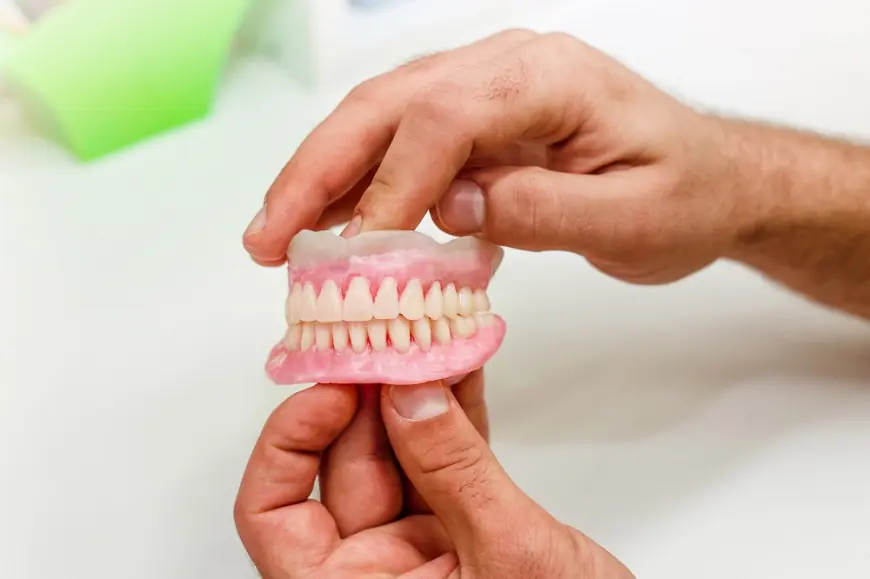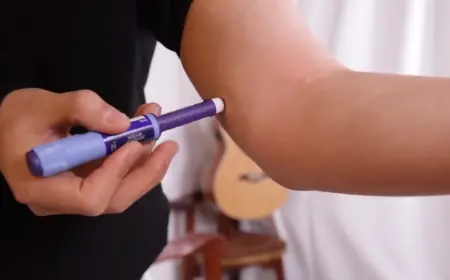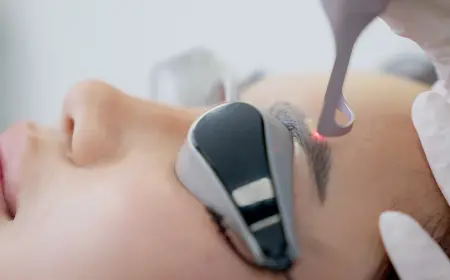Partial Dentures: A Simple Solution for a Complete Smile
We'll cover what they are, their benefits, types, maintenance tips, and what to expect throughout the process.

Tooth loss is a common issue affecting people of all ages. Whether due to injury, decay, or gum disease, missing teeth can significantly impact your self-esteem, oral health, and overall quality of life. Fortunately, modern dental solutions like partial dentures offer a practical and affordable way to restore your smile, function, and confidence.
If you're considering tooth replacement options, this guide will help you understand why partial dentures are often the ideal choice. We'll cover what they are, their benefits, types, maintenance tips, and what to expect throughout the process.
What Are Partial Dentures?
Partial dentures are removable dental appliances used to replace one or more missing teeth in the upper or lower jaw. Unlike full dentures, which replace an entire arch of teeth, partial dentures are designed to fill specific gaps while preserving the rest of your natural teeth.
A typical partial denture consists of:
-
Artificial teeth made from acrylic or porcelain
-
A gum-colored base that blends with your natural gums
-
A framework (usually metal or flexible plastic) that holds the denture in place by attaching to adjacent teeth
They are custom-made to fit your mouth precisely, offering both comfort and functionality.
Why Choose Partial Dentures?
✅ 1. Restore Function and Appearance
Missing teeth can make everyday tasks like chewing and speaking more difficult. Partial dentures help restore your bite and speech clarity while also improving your facial aesthetics. A complete smile enhances your confidence and supports your overall well-being.
✅ 2. Preserve Remaining Teeth
When gaps are left untreated, surrounding teeth tend to shift, leading to misalignment and bite issues. Partial dentures provide support and prevent the movement of adjacent teeth, protecting your long-term dental health.
✅ 3. Non-Invasive and Cost-Effective
Unlike dental implants or bridges, which require surgery or alteration of neighboring teeth, partial dentures are non-invasive. They’re also one of the most budget-friendly options available for tooth replacement.
✅ 4. Easy to Adjust and Replace
As your mouth changes over time, your dentist can adjust, reline, or replace your partial dentures to maintain a comfortable fit and function. This flexibility makes them a practical long-term solution.
Types of Partial Dentures
Several types of partial dentures are available, depending on your needs, budget, and preferences:
1. Cast Metal Partial Dentures
-
Structure: Metal framework with acrylic base
-
Pros: Durable, strong, long-lasting
-
Cons: May show visible clasps
2. Acrylic Partial Dentures
-
Structure: All-acrylic material with metal clasps
-
Pros: Affordable, easy to adjust
-
Cons: Bulkier, less durable than metal
3. Flexible Partial Dentures
-
Structure: Flexible, gum-colored plastic
-
Pros: Lightweight, aesthetically pleasing, no metal
-
Cons: May not be as durable long-term
Your dentist will help you choose the best option based on your mouth's condition and your specific goals.
The Process of Getting Partial Dentures
Getting partial dentures typically involves a few dental appointments over the course of several weeks. Here's what you can expect:
Step 1: Initial Consultation
Your dentist will examine your teeth and gums, take X-rays, and discuss whether partial dentures are suitable for you.
Step 2: Impressions and Measurements
Precise molds of your mouth are taken to ensure the dentures fit comfortably and align properly with your bite.
Step 3: Denture Fabrication
The impressions are sent to a dental lab where your partial dentures are custom-made. This process usually takes 1–2 weeks.
Step 4: Fitting and Adjustments
Once your dentures are ready, you'll try them on. Your dentist will make any necessary adjustments to ensure a snug, comfortable fit.
Step 5: Follow-Up
After wearing your dentures for a few days, you may return for a follow-up visit to address any pressure points or discomfort.
Caring for Your Partial Dentures
Proper care ensures your partial dentures stay in good condition and last as long as possible. Here are some essential maintenance tips:
✅ Clean Daily
Brush your dentures gently with a soft denture brush and a non-abrasive cleanser. Avoid using regular toothpaste, as it can be too harsh.
✅ Soak Overnight
When not in use, soak your dentures in a denture-cleaning solution or plain water to prevent drying and warping.
✅ Handle with Care
Avoid dropping your dentures or using hot water, which can damage the material. Always clean them over a towel or water-filled sink.
✅ Maintain Oral Hygiene
Continue to brush your remaining natural teeth, gums, and tongue to keep your mouth healthy and fresh.
✅ Visit Your Dentist Regularly
Schedule routine check-ups so your dentist can inspect the fit and condition of your partial dentures and make adjustments if needed.
Common Questions About Partial Dentures
❓ Will partial dentures look natural?
Yes, modern partial dentures are designed to blend in with your existing teeth. The color, shape, and size of the prosthetic teeth are matched to your natural smile.
❓ Can I eat normally with partial dentures?
Most people adjust to eating with dentures within a few days. Start with soft foods, chew slowly, and use both sides of your mouth to help stabilize the denture.
❓ How long do partial dentures last?
With good care, partial dentures typically last between 5 to 10 years. However, your mouth changes over time, so periodic adjustments or replacements may be necessary.
❓ Can I sleep with partial dentures in?
It’s generally recommended to remove your dentures at night to give your gums a break and allow for proper cleaning.
Pros and Cons at a Glance
| Pros | Cons |
|---|---|
| Affordable and accessible | May feel bulky initially |
| Non-invasive and reversible | Requires daily cleaning and maintenance |
| Custom fit for comfort and function | May need periodic adjustments |
| Supports natural teeth and prevents shifting | Not as permanent or stable as implants |
Are Partial Dentures Right for You?
Partial dentures are a great option if you:
-
Have one or more missing teeth
-
Still have healthy teeth in the same arch
-
Prefer a non-surgical and budget-conscious solution
-
Want a reliable, removable option that’s easy to maintain
However, they may not be the best choice if you’re looking for a permanent solution or have gum disease or severe bone loss. In such cases, alternatives like dental implants or bridges may be more suitable.
Final Thoughts
A complete smile doesn’t have to be complicated. Partial dentures offer a simple, cost-effective, and customizable solution for anyone missing teeth. They restore your ability to chew and speak, enhance your appearance, and support your overall oral health—all without the need for surgery.
If you’re exploring tooth replacement options, consult with your dentist to see if partial dentures are the right choice for you. With the right care and a proper fit, they can help you regain your smile and your confidence.
What's Your Reaction?
 Like
0
Like
0
 Dislike
0
Dislike
0
 Love
0
Love
0
 Funny
0
Funny
0
 Angry
0
Angry
0
 Sad
0
Sad
0
 Wow
0
Wow
0












































